Essential Guidelines for Caring for Pet Birds on Vacation
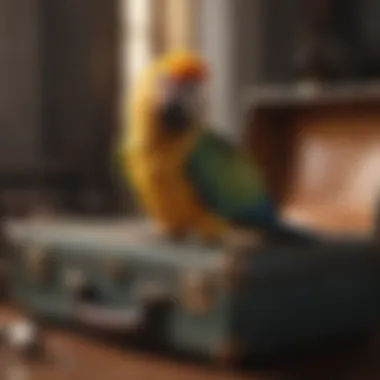
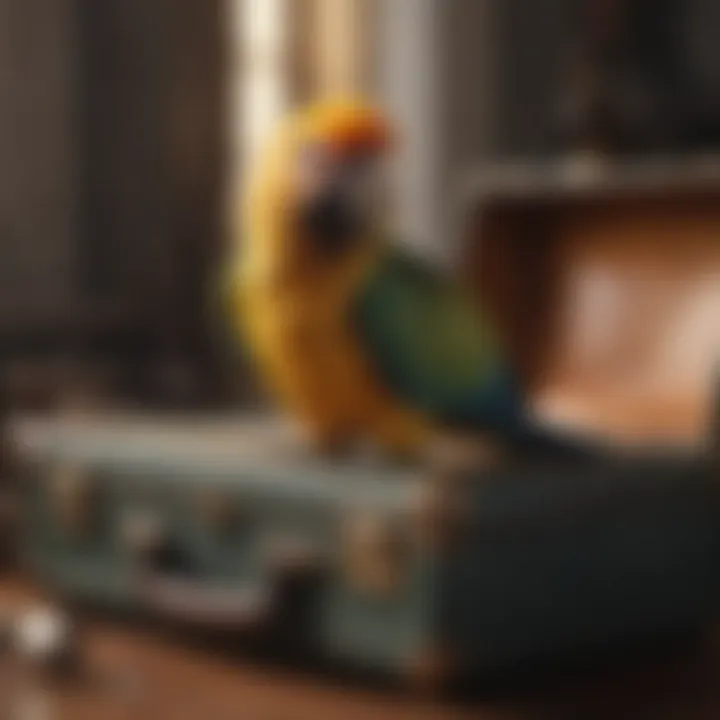
Intro
Caring for pet birds while on vacation poses unique challenges for bird owners. These fascinating creatures thrive on routine and attention. Leaving them in someone else's hands, or even alone, can fuel concern for their well-being. Therefore, careful planning is vital for their proper care and happiness during your absence. This guide provides detailed advice on various strategies available for managing pet bird care during vacation periods.
Care Tips
Daily Care Routines
Consistency in daily care routines is essential. Prior to leaving, instill stable habits for your feathered companions. Ensure whoever is responsible for the birds knows their feeding schedule, the frequency of social interaction, and the general needs of each bird. Each species has unique care requirements, so clarify which specific routines align best with your bird's routine.
Cage Setup and Maintenance
Setting up an appropriate environment is critical. Clean the cage thoroughly before leaving. A tidy habitat reduces stress and contributes to a positive living space. Modify perches, toys, and feeding bins according to any sitter's preferences or safety measures. Make sure food and water sources are plentiful and easy to access so that caregivers can monitor the availability easily.
Hygiene and Cleaning Practices
Maintaining hygiene while away ensures your bird's health. All food dishes and water containers ought to be cleaned and disinfected before your absence, reducing contamination risks. Provide a checklist for the caretaker outlining necessary cleaning steps.
Seasonal Care Adjustments
Seasonal changes may affect bird care routines. For example, during summer months, ensure adequate cooling for birds due to heat. In contrast, ensure your birds are warm in colder months. Consider the individual bird’s dismissed needs as avian organisms are sensitive to temperature fluctuations.
Behavioral Insights
Understanding Bird Body Language
Being aware of a bird's body language is paramount in caretaking routines. While on vacation, it's crucial that caretakers understand normal behaviors and any signals of distress. Constant vigilance will ensure stress levels are kept low for the bird during the adjustment period.
Common Behavioral Issues and Solutions
Pet birds may exhibit various behavioral challenges when their owners are away. Caregivers should be advised to observe for signs of anxiety, such as plucking feathers or excessive vocalization. Developing a system of condition monitoring during the absence will be beneficial.
Positive Reinforcement Techniques
Applying positive reinforcement enhances caretaking experience for both birds and caregivers. By rewarding desired behaviors with treats or attention, caregivers can minimize undesirable behaviors arising from stress or anxiety.
Social Interaction Needs
Birds are social animals requiring interactive engagement. In your absence, ensure someone is committed to spending adequate time with them. This can drastically depict their adjustment to temporary change in environment and routine.
Nutrition Guides
Essential Diet Components
Diet cannot be overlooked during vacation planning. Ensure your caretaker understands what types of food are suitable for their specific species. Sunflower seeds might be viewed by some as treats, but not sustained diets. So balance in blends of seeds, fruits, and greens must be established.
Safe and Toxic Foods
Publish a clear list of safe foods and those to avoid. Knowing what foods are suitable for birds goes a long way. Certain common foods, like avocados or chocolate, are harmful to our avian companions.
Supplements and Treats
Consider appropriate supplements that provide extra nutrition. Vitamins or probiotics may be a part of the diet. Position them visibly for the caretaker so they remain an ongoing trial.
Feeding Strategies for Different Species
Account for the intricacies among species when providing guidance on feeding methods. Consult material related to specific species for proper care. Parrots have diverse needs compared to canaries or finches. Often, lists outlining preferred diets by species exist and can specified clearly.
Wellness and Health
Routine Health Checkups
Schedule routine health observations before travel. A quick professional evaluation reduces potential health complications. Be sure the caregiver has access to veterinary contact information in case emergencies arise.
Identifying Symptoms of Illness
Teaching caretakers about common symptoms to observe assists. Loss of appetite, lethargy, or isolation may indicate health issues. Being perceptive enhances a caregiver's readiness to respond swiftly when necessary.
Preventative Care and Vaccinations
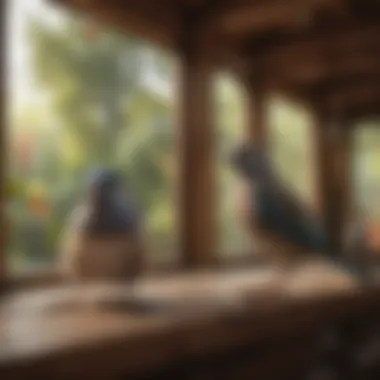
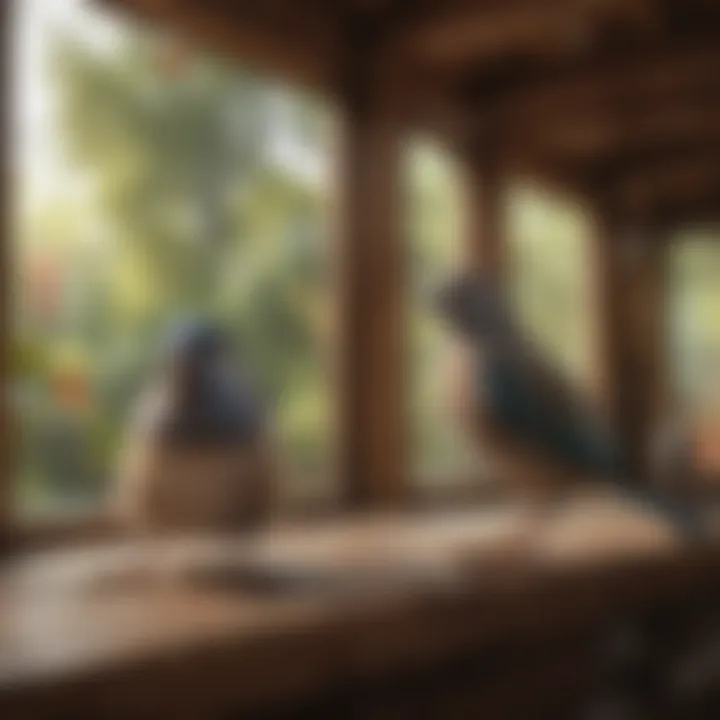
Check all birds’ vaccination status and up-to-date records before travel. This prevents accreditation of diseases that could complicate post-vacation health.
Mental and Emotional Well-being
Monitor rituals at home encourages a healthy mental space for avian friends. Include specific toys for mental stimulation within the caregivers' guide too.
Enriching Activities
Toys and Playtime Ideas
Inject creativity into a bird's environment with stimulating toys. Providing access to interactive playpieces encourages successful coping methods. Make recommendations based on your observer counties with regards to space and safety.
Training and Tricks
If the caregiver has experience, consider some training activities that continue progress amid the absence from you. Document basics for sitters to follow. Avian training continually engages and might bridge emotional gaps during your time away.
Outdoor Activities and Interaction
With due caution, supervise outdoor time. Committee the caregiver explaining ways to safely engage your bird in unique situations, like flight in a vetted area.
DIY Projects for Mental Stimulation
Encourage caretakers to make DIY toys or feeding puzzles. Craft solutions shared by spaces frequented by bird-lovers enhance engagement levels. Check platforms showcasing simple ideas, like those often from for forums on reddit.com.
Strong preparations for your pet bird strengthen both their emotional and physical well-being during your time away. With thorough consideration, they thrive while you enjoy your vacation.
Understanding the Needs of Pet Birds
Understanding the specific requirements of pet birds is crucial for responsible ownership. Birds, as pets, have unique needs that differ significantly from the requirements of more common household pets, such as dogs and cats. Ignoring these needs can result in stress or health problems for your avian companions. Therefore, being informed can help owners create a suitable environment, fostering better overall well-being.
One effective way to ensure a bird's needs are met while owners enjoy their vacation is through detailed planning in advance. Owners need to identify what their framlyinclusive pets require in terms of housing, food, and social interaction. Developing a routine can signifieault* becomes paramount, addressing how care differs from day to day.
Basic Care Requirements
Basic care is fundamental to a stable and happy life for pet birds. Most birds require spacious cages equipped with perches, toys, and essentials items for mental stimulation. These elements not only entertain them but also promote healthy exercise.
Moreover, a balanced diet is another essential need. Birds typically thrive on a mix of seeds, pellets, fruits, and vegetables. Knowing the specific dietary needs based on the species of bird is vital for ensuring their health. Dirty water should be avoided, so clean and fresh water must be provided daily.
Behavioral Considerations
Birds are social creatures that require interaction to remain mentally and emotionally healthy. Before leaving for vacation, owners should consider how much social engagement their pet requires. Birds deprived of attention may become distressed, leading to destructive behaviors or health issues.
Potential solutions include scheduling regular interaction times before departure, gradually preparing the bird for reduced attention. Also important is ensuring toys are available to keep them busy, which helps mitigate anxiety.
Health Monitoring
Monitoring a bird's health should be ongoing. Observing their eating habits, vocalizations, and behavior is essential. Health problems can arise unexpectedly, hence being alert to any changes can prevent complications.
In the lead-up to vacation, it may be wise to schedule a veterinary check-up to identify any hidden health issues. Preparing a written health history for caregivers can significantly aid their efforts while the owner is away, reducing stress on both pet and sitter.
“By taking the time to understand the needs of your pet bird, you reduce risks associated with vacationing and set the groundwork for their well-being.”
Planning for Vacation
Planning how to care for your pet bird during vacations is crucial. Bird ownership is a significant responsibility. This means you cannot simply leave your pet as you might with a simple houseplant. Making thoughtful preparations ensures your pet's safety and well-being while you are away. Without proper planning, your bird may experience unnecessary stress, leading to a decline in its health and emotional state.
Timing Your Vacation
Choosing an appropriate time for your vacation can impact the overall experience for both you and your bird. Considerations include your bird's personality and any seasonal factors affecting its routine. For example, if your bird is more anxious, avoid planning trips during particularly loud or busy times at home.
Also think about the weather. An extreme change of temperature, whether hot or cold can adversely affect your bird if left in certain environments. Seasonality also comes into play since some birds thrive better with abundant natural light and warmth. Take time to consider when your bird is at its happiest, and plan accordingly.
Assessing the Length of Absence
The length of your time away should determine your approach to bird care. A day's journey might only require basic provisions to be set. However, a prolonged absence could necessitate more substantial arrangements, like hiring a pet sitter or considering a trustworthy boarding facility.
Evaluate your bird's behavior normally. For some birds, two weeks away can trigger separation anxiety, while others may adapt more easily. A proper understanding of your specific bird's needs and comfort levels will guide your decisions. Make sure to choose options that will not overly disrupt their routine. The goal is to make your bird feel secure in your absence.
Options for Bird Care During Vacation
Ensuring the well-being of pet birds while on vacation requires careful planning and thought. The options available vary, and this section will delve into various care strategies. By weighing the pros and cons, bird owners can choose what aligns best with their needs. Different choices, such as hiring a pet sitter, using boarding facilities, or setting up at-home care arrangements, offer their own sets of benefits and considerations.
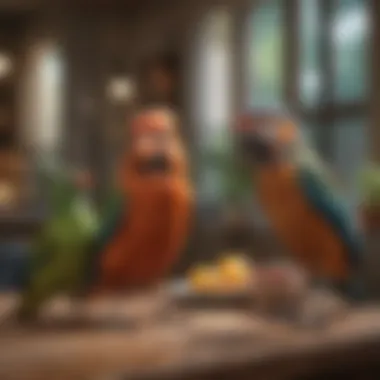
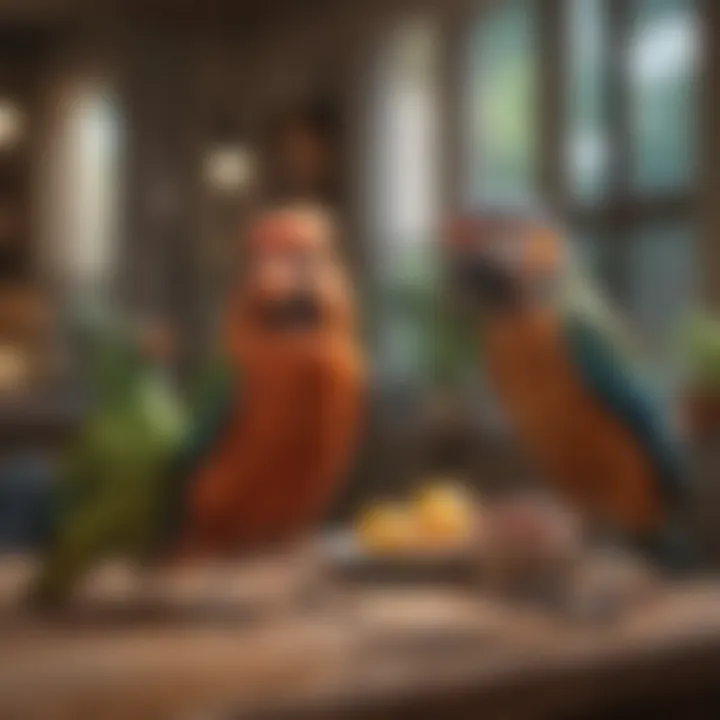
Hiring a Pet Sitter
Finding Trusted Sitters
The process of finding a pet sitter can significantly impact the care your bird receives. At its core, the characteristic of trust is essential in simplifying bird care during an absence. It ensures that pets receive quality attention, which minimizes stress during the time away from their owner.
A reliable pet sitter understands avian needs. They should have experience with birds and a genuine affinity for their well-being. One unique feature of employing a trusted sitter is the personalized approach they offer, especialy compared to a standard boarding facility.
One disadvantage can be difficulty in finding sitters specialized in bird care or the risk of choosing an inexperienced sitter leading to potential harm or undue stress for the bird. Websites, word-of-mouth referrals, or local listings may help increase the chances of finding the right fit.
Preparing Instructions for Care
Framing clear care instructions is vital for a smooth care experience while away. These instructions serve as a roadmap for your pet sitter, guiding them through daily routines and specific needs.
The main advantage of preparing detailed care instructions is the reduction in uncertainty. Sitters can follow concise instructions on feeding schedules and any behavioral peculiarities, which optimizes the bird's comfort.
One unique quality of these instructions is specificity. Highlighting potential hazards around your home upon caring can also aid sitters to avoid mishaps. On the downside, unclear instructions may lead to uneven care standards, which could negatively impact the bird.
Using Boarding Facilities
Selecting a Suitable Facility
Choosing the correct boarding facility forms the foundation of a good care experience. With several facilities available, the key here is evaluating their practices and environment concerning avian care. An appropriate facility tends to prioritize the comfort and safety of the birds over merely profit.
Furthermore, a proper boarding facility often generates a more social atmosphere. Pet birds can interact with other birds, which might assist in preventing loneliness in their owners' absence. Additionally, they usually do a through health evaluation before accepting pets, ensuring that various creatures are either compatible or healthy, thus easing many owner's worries regarding illness.
Conversely, familiarizing oneself with policies about feathered friends could be cumbersome. Facilities may stand as expensive options, could feature varied services depending on clientele preferences or regional standards.
Preparing for the Boarding Experience
Preparing your bird for the boarding experience must not be neglected. This segment looks into how gradual acclimatization can elevating a boarding experience. Birds accustomed to their own surroundings may find sudden changes overwhelming.
One primary characteristic of good preparation is its primary goal to reduce anxiety. Engaging in prior visits assists birds with recognizing the interior of the facility and caregivers. This brings a slight familiarity and helps avoid stress when the time arises for them to stay.
Yet another aspect is promoting healthy transition. Birds need a comfortable cage to help adapt when settling into a new environment. These preparations, although somewhat logistical and laborious, optimize pet comfort but do present the likelihood of delayed arrangements not working smoothly for all breeds or ages.
At-Home Care Options
Enlisting Friends or Family
Choosing to enlist friends or family represents a simplistic yet very effective solution to pet care scenario at home. The core factor here is the element of caution; a familiar person tends to ease any household disruption your birds may face.
One key reason this option suits many pet owners is cost-effectiveness. Friends or a family member typically may not demand a fee compared to professional services. With established bonds, birds are less likely to feel isolated from their owners' absence, which helps ease distress.
Nevertheless, one must evaluate the feed habits, out of comfort or lack of experience prior to youium, which can cause awkward moments or trouble. Defining clear roles in advance will acomplish trifecta: cost-effective, less active voice alteration, familial bonds prevail of all.
Creating a Routine for Home Care
Establishing a clear routine for at-home care becomes crucial in ensuring nothing is lost in process although away. This solidifies maintaining feeding, socialization, and daily exposure settings, improving your bird’s emotional states.
Significantly, having a predetermined routine can cultivate stability for birds. Understanding steps create a select mental avaluel according to their previous brighten-relating interest resulting in secure integration while temporarily separated from their owner.
Once appoint by a caregiver following daily stands, the consistency reduces the common stresses triggered when needs fall short of addressing expecting targets. Cost naturally included routes adoptable for customization favors can tailor routine. Conversely, lack of consistency or close-detail observation harms birds without specifics added each time reopened.
These alternatives – utilizing a pet sitter or boarding facility as apropit clic, voting style advantage bookkeeping outcomes prioritizes comfort for the lively feathers we call our friend during travel.
Preparing Your Bird for Time Away
Preparing your pet bird for a period of absenteeism is an essential task that warrants careful consideration. Setting the stage for a smooth transition not only eases the stress experienced by the bird but also assures the owner of their pet's well-being during their absence. Focusing on acclimatization and maintaining established routines will promote overall comfort and stability for your avian companion. By addressing these elements, one can minimize behavioral disturbances and provide a better environment in which the bird remains healthy and less anxious.
Acclimatization Process
The acclimatization process involves arranging an environment where your pet bird feels comfortable with the anticipated absence. Birds can be sensitive to changes in routine and may feel disoriented when changes occur unexpectedly. To mitigate stress, integrate gradual adaptations by exploring various settings.
For instance:
- Introduce short departures before longer absences to allow your bird to adjust to the idea.
- Utilize different rooms of the house for seating or playing, so your pet becomes familiar with being in varied spaces.
- Engage with a new sitter or caregiver in advance, allowing your bird to become accustomed to their presence.
The focus should remain on fostering an iterative adjustment process. Recognizing if the bird exhibits signs of anxiety is crucial; these might include feather plucking or excessive vocalizations. Addressing the behavioral shifts promptly and using positive reinforcement can encourage a smoother transition.
Maintaining Routine
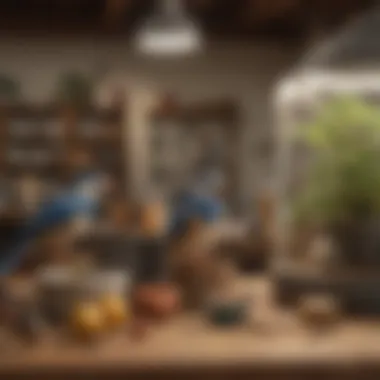
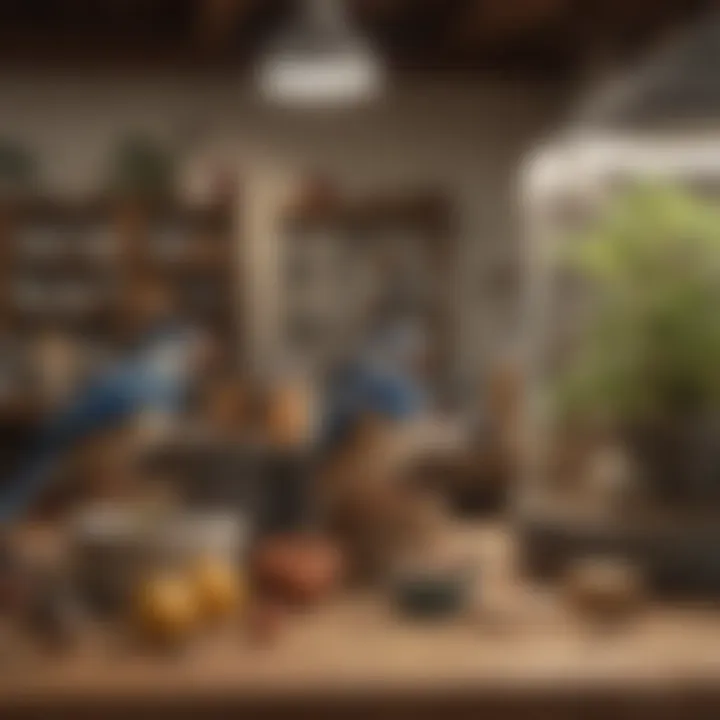
Establishing and maintaining a strong routine adds significant value to a pet bird's emotional well-being, especially during transitions. Birds are naturally creatures of habit, thus having predictable activities can provide much-needed comfort. Here are a few key components to consider while solidifying this structure:
- Feeding Schedule: Consistency in mealtime is philosophy everyone with pets understands but executing it well is vital. Birds thrive when they are accustomed to , so ensure the schedule remains intact.
- Playtime Sessions: Setting aside daily blocks for play and interaction can help keep your bird oriented in their familiar rhythms, no matter who is offering the attention.
- Cage Cleaning and Maintenance: Keeping habitats clean and neat is also essential. This should happen according to established routines instead of inconsistent changes.
Building such routines eliminates the unsettling experiences that change could elicit. For a pet bird, remaining in its comfort zone is critical. When a new caregiver steps in, providing them with a timetable of the regular routine can help establish continuity while the owner is away.
Regular maintenance of established routines is not a minor detail. It holds considerable sway over the emotional stability of the bird during .
Emphasizing the importance of acclimatization and routine arrangement is justified. Effective preparation allows pet owners to focus less on their birds while on vacation, knowing they made the correct arrangements for their beloved companions.
Ensuring Safety and Comfort
Having adequate safety measures and ensuring comfort for your pet birds while you are away is crucial. Birds are sensitive creatures. Their well-being can often become compromised in a new environment or during changes in routine. This section aims to explore important elements to consider to ensure your pet’s safety and comfort while you, as their owner, are enjoying your vacation.
Creating a Safe Environment
Creating a safe environment is the first priority when caring for a pet bird. If you choose to use a pet sitter or a boarding facility, understanding the points which create a safe space for birds is paramount.
- Secure Enclosures: The bird’s cage must be escape-proof and should be equipped with safe toys and perches that do not risk injury. Check that there are no spaces too wide for the bird to sneak through.
- Environmental Hazards: Make sure the area selected for the bird does not contain potential hazards such as toxic substances, open windows, or other pets that could disturb or harm the bird. Evidence have shown that birds can be curious; thus, it is necessary to stay ahead of potential dangers.
- Temperature Control: Birds are sensitive to temperature changes. Keeping the environment at a consistent, comfortable temperature can help ensure that your bird stays healthy. A sudden drop or rise in temperature can lead to stress or sickness.
Establishing controlled safety measures can significantly reduce the likelihood of distress during your absence.
Addressing Dietary Needs
When caring for pet birds, attention to their dietary needs is essential. Nutrition should not be put on the back burner just because you're away.
- Stocking Up on Pellets and Seeds: Before leaving, ensure you have sufficiently stocked their cage with high-quality pellets and seeds. Brands like Harrison's and Kaytee offer great bird foods that cover nutrition.
- Fresh Food and Water: If your pet sitter agrees, having fresh fruits and vegetables delivered daily glorifies meals for your birds. Remember to also have containers for fresh water that will maintain cleanliness throughout.
- Knowing Allergies: If your pet has dietary restrictions or allergies, it is critical for them to adhere to the essential limitations. Make sure your caregiver understands what foods are safe and preferred.
Offering their normal food routine goes a long way to set a tone of comfort for your bird while separated. It plays an exceptionally vital role in their health.
Remember, both safety and comfort can significantly contribute to a smoother transition for your beloved companions while you are away.
Post-Vacation Care
Post-vacation care for pet birds is crucial. When bird owners return home, the task to reconnect with their pets signifies more than just good feelings; it has essential implications for the overall well-being of the birds. After spending time away, these creatures may experience anxiety or confusion from their changed environment or their daily routines. Close attention should be given to ensure feelings of security and comfort are reinstated.
It has to be noted that birds can easily become stressed, affecting their behavior and health. Hence, understanding the importance of post-vacation care is fundamental. Such care includes re-establishing connections and monitoring health. Each careful action contributes to easing any potential upset.
Re-establishing Bonding
The re-establishment of bonding with your bird is vital for emotional recovery after time away. Your pet relies on you for affection in the same way you find comfort in their presence. Birds thrive in reciprocal relationships with their owners, so intimacy remains essential.
When returning from holiday, initially create a calm environment. Speak softly and avoid sudden movements; this makes you more approachable to an anxious bird. Gradual interactions, such as gentle head scratches or offering favorite treats, help reassure them. Slowly including engaging activities can further open the lines of communication. Together, bonding can be fortified by fencing proportions of time spent alone. Involving consistent interaction in familiar habits will lead you both together again.
Tips for Re-establishing Bond:
- Allow the bird to approach you when they feel ready.
- Use treats to ignite positive reinforcement.
- Dedicate uninterrupted quality time for playing and talking.
- Observe their body language for hints on comfort levels.
Monitoring Health After Return
Post-vacation evaluations of your bird’s health must occur to catch any potential issues early. Holiday environments sometimes differ substantially from home. Changes include food and exposure to unfamiliar surroundings or other creatures. Monitoring health can involve observing a variety of factors.
The following aspects should be considered:
- Behavior changes: Look for signs of lethargy or aggression, indicating the bird’s ongoing stress.
- Eating habits: Be attentive to create a diet allowing your bird blend together familiar and new foods thoughtfully.
- Physical check-up: If possible, schedule a veterinary examination for a thorough inspection. Bean able to proactively extend oversight than reactive.
Taking careful actions promotes not only successful adaptation but also sets a positive longitudinal bond of trust with your bird.
Reflect on all routine patterns reinstated. Address their emotional health as it be beneficial in the long run. Post-vacation care showcases your pet bird’s enriched experiences while embracing a richer connection.
Finale
The conclusion of this article underscores the importance of caring for pet birds while on vacation. This topic holds significance for bird owners in ensuring the continual well-being of their feathered friends, even in their absence. Taking the time to explore various care options does not simply provide logistical solutions, but it extends to making informed choices that contribute to the emotional and physical health of the birds.
Summary of Care Choices
When preparing for a vacation, kept overall welfare in consideration. Bird owners have several care choices. These choices consist of hiring a pet sitter, utilizing boarding facilities, or arranging at-home care. Each option has different aspects:
- Pet Sitter: Offers personalized attention and minimizes disruption.
- Boarding Facility: Provides a structured environment with social interaction.
- At-Home Care: Maintains comfort and familiarity in a bird's own space.
Making informed decisions regarding these choices allows bird owners to manage their birds’ needs effectively while promoting a stable environment during their time away.
Emphasizing Responsibility
In caring for pet birds, one must recognize the responsibility involved in ensuring their care and safety. Leaving birds alone without a plan can lead to unnecessary stress or health complications. Effective care comes from planning and responsibility from the bird owner. Prioritizing their needs holds both ethical and practical significance.
Regular assessments prior to leaving can help bird owners feel more in control. It reflects a commitment to the creatures they care for. Thus, understanding and effectively managing these responsibilities demonstrates a true passion for avian welfare.















